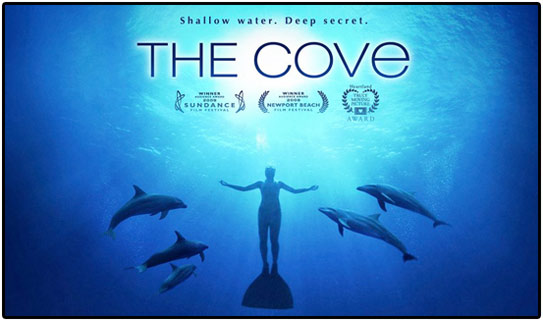“The Cove” Weds Essay and Narrative Structures
Go see The Cove. I missed it at Sundance last year, but I finally saw it in a theater this week. If you are wondering how to structure your documentary, examine this brilliant example of a documentary film that weds a three-act narrative structure with a powerful essay format.
Director Louis Psihoyos’ Sundance Film Festival hit follows a team of activists who seek to expose the dolphin slaughter in Taiji, Japan.
The story side of the film starts with conflict: our activist hero Ric O’Barry, who trained dolphins for the Flipper TV series, is being followed by the Japanese cops. We learn about O’Barry’s back story and the catalyst event that changed his life and propelled him on a mission to release dolphins from captivity. One day he was training “Cathy” (a.k.a. “Flipper”) and she swam into his arms, looked him in the eyes and committed suicide. Seriously. Unlike humans, dolphins can voluntarily control and stop their breathing. Can you imagine a more riveting inciting incident than your beloved Flipper dying in your arms?
As O’Barry and his team seek to expose dolphin slaughter in the harbor town of Taiji, the film builds towards an extraordinary and obligatory climax when the team infiltrates the barricaded cove with hidden cameras. The resulting blood bath caught on tape is exposed at an international whaling confederation, where the film’s sub plot about the Japanese delegate’s efforts to lift the ban on whaling also wraps up.
Upon this narrative backbone, award winning Sicko editor Lloyd Parry cleverly weaves the essay part of the film. The central premise is that dolphins are sentient, self-aware beings and we humans are mistreating them. At appropriate plot points, The Cove post-production team seamlessly segues into their essay points revealing supporting arguments for their premise. Among the pile of evidence: research on dolphins recognizing themselves in mirrors, evidence of mercury poisoning found in dolphin meat, and data on dolphin’s acute sense of hearing and the suffering they endure at popular “swimming with dolphins” venues.
The Cove is a superb example of social activist filmmaking. It is a documentary that will thrill you with the hero’s call to adventure and rivet you with irrefutable evidence.
I also highly recommend Editing the Character Driven Documentary, an online seminar that will teach you, step by step, the building blocks of a well told tale which The Cove illustrates so powerfully. You can find it on my website.
Go to http://www.newdocediting.com/land/editingdocumentaryecourse/
